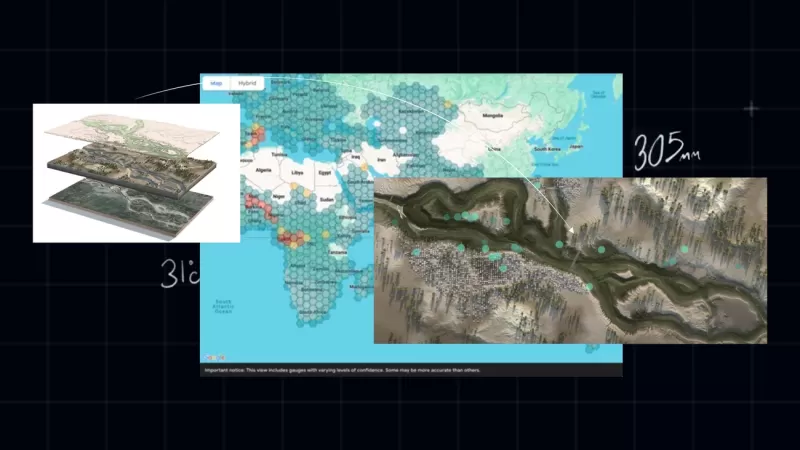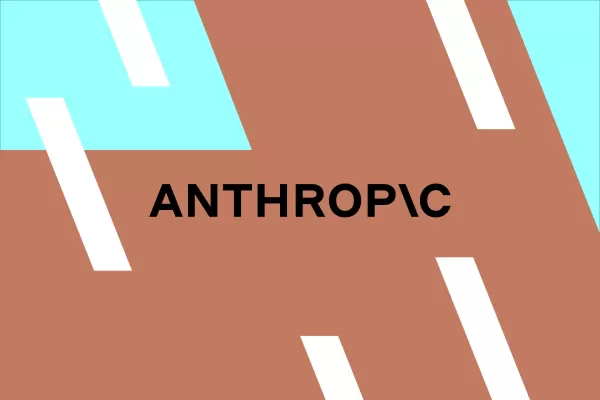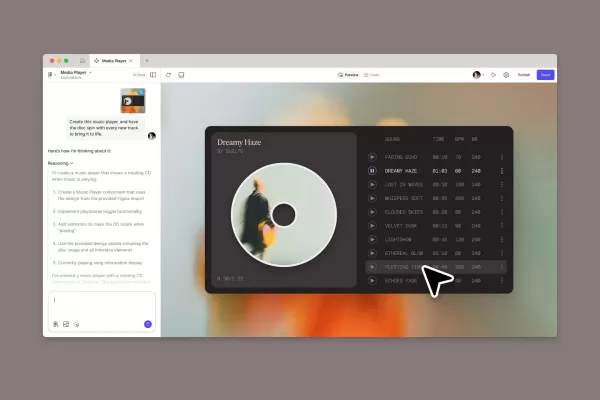Advanced Flood Hub: Enhancing Aid and Government Response

Floods keep wreaking havoc on communities around the globe, pushing the need for better flood forecasting. That's where AI comes in, and Google Research has been all over it, using AI models and satellite imagery to make flood predictions faster and more reliable. They're also teaming up with partners to help out folks in vulnerable spots worldwide.
We've just launched some cool new features on Flood Hub that let experts get a better handle on flood risks in specific areas. With the new inundation history maps, you can check out high-res flood risk zones on the map, even when there's no current flood happening. This is super handy for planning ahead or when real-time flood maps aren't available. Head over to the Flood Hub Help Center for more details on these maps and other stuff.
Flood Hub inundation history map layer around Nigeria
With the basin view per gauge, Flood Hub helps flood experts pinpoint the best spots for tracking, like villages, hospitals, or shelters, right on the map.
Flood Hub with selected gauge and its basin
The latest Flood Hub updates bring even more to the table for flood experts at aid groups, governments, and research teams. There's a new layers panel where you can toggle different map layers on and off, making it easier to understand each one. Plus, an improved gauge panel and an updated Help Center give you the lowdown on all the Flood Hub's features and flood models.
How these new tools support field work
Our flood forecasting tools, like Flood Hub, Floods API, and the historical dataset, are here to help aid organizations, governments, and researchers with detailed, long-range flood info. We're working with these groups because they've got systems in place to give early warnings and start relief efforts early. In 2024, we saw this in action through our partnerships with Give Directly and the International Rescue Committee in Nigeria and Bangladesh. These collaborations let aid groups use our tech to respond better and help communities get ready for future floods.
Support for AI-powered flood relief in Nigeria
We've talked before about how international partnerships are using AI to get ready for floods. In June 2024, Google.org funded Give Directly and the International Rescue Committee to provide cash support to 7,500 people in Nigeria.
GiveDirectly worked in Kogi state along the Niger river, and IRC was active on the Benue river in eastern Nigeria. GiveDirectly used the Google Flood API with their anticipatory action systems to get village-specific alerts and start cash transfers.
Federico Barreras, a humanitarian manager at GiveDirectly, explains, “With Google's historical data, we figured out which areas were most at risk of flooding. Using the Google Flood API, we knew when floods were about to hit our target areas, so we could deliver cash assistance before the peak to those who needed it most.”
This was the first time AI-powered cash relief was used in Africa, getting aid to communities 5-7 days before the flood peak in Nigeria during September - October 2024. The idea is to give families the cash they need to buy food and protect their stuff before disaster strikes. Studies show that knowing about a disaster ahead of time not only helps you prepare better but also cuts down on the costs of dealing with it.
Besides using the Google Flood API to trigger cash relief for 3,000 households in Adamawa State, the IRC is applying this approach in other places, like Northern Kenya. Miles Murray, the IRC's Anticipatory Action Specialist, says, “We're using this automated flood Anticipatory Action method in other areas too, like Northern Kenya, where there was no flood forecast data before, but now AI gives us dozens of reporting points, helping more families get AI-powered cash relief.”
Cash transfers support for affected families in Bangladesh
In Bangladesh, where the Jamuna River basin faces devastating floods every year, GiveDirectly used Google’s Flood Hub to roll out AI-driven anticipatory action. Before the flood season hit in July this year, families in high-risk areas got cash transfers, letting them buy essentials and protect their property. This showed how AI can boost flood forecasting and directly help affected communities. Abir Chowdhury, Bangladesh interim country director at GiveDirectly, says, “In Bangladesh, we usually set anticipatory action triggers at the district level, which covers big areas. But with Google’s AI-powered forecasts, we tried a more targeted approach — sending anticipatory cash to villages to reach the most at-risk communities before floods hit.”
Looking ahead
As we keep expanding Flood Hub's reach and improving its features, we're all in on creating new tools to boost flood preparedness, response, and recovery around the world. Our aim is to help international organizations act fast and make local communities stronger against climate crises.
Government agencies, NGOs, and researchers can access a free, shareable map of all river gauge data — past and forecasted — updated daily. Check out our Flood Forecasting research site to use Flood Hub or learn more.
Related article
 "Dot AI Companion App Announces Closure, Discontinues Personalized Service"
Dot, an AI companion application designed to function as a personal friend and confidant, will cease operations, according to a Friday announcement from its developers. New Computer, the startup behind Dot, stated on its website that the service will
"Dot AI Companion App Announces Closure, Discontinues Personalized Service"
Dot, an AI companion application designed to function as a personal friend and confidant, will cease operations, according to a Friday announcement from its developers. New Computer, the startup behind Dot, stated on its website that the service will
 Anthropic Resolves Legal Case Over AI-Generated Book Piracy
Anthropic has reached a resolution in a significant copyright dispute with US authors, agreeing to a proposed class action settlement that avoids a potentially costly trial. The agreement, filed in court documents this Tuesday, stems from allegations
Anthropic Resolves Legal Case Over AI-Generated Book Piracy
Anthropic has reached a resolution in a significant copyright dispute with US authors, agreeing to a proposed class action settlement that avoids a potentially costly trial. The agreement, filed in court documents this Tuesday, stems from allegations
 Figma Releases AI-Powered App Builder Tool to All Users
Figma Make, the innovative prompt-to-app development platform unveiled earlier this year, has officially exited beta and rolled out to all users. This groundbreaking tool joins the ranks of AI-powered coding assistants like Google's Gemini Code Assis
Comments (43)
0/200
Figma Releases AI-Powered App Builder Tool to All Users
Figma Make, the innovative prompt-to-app development platform unveiled earlier this year, has officially exited beta and rolled out to all users. This groundbreaking tool joins the ranks of AI-powered coding assistants like Google's Gemini Code Assis
Comments (43)
0/200
![RaymondGarcia]() RaymondGarcia
RaymondGarcia
 August 26, 2025 at 1:59:22 AM EDT
August 26, 2025 at 1:59:22 AM EDT
AI flood forecasting sounds cool, but can it keep up with climate change's wild curveballs? 🌊 Google’s on it, but I’m curious how it’ll handle freak storms.


 0
0
![WillieJohnson]() WillieJohnson
WillieJohnson
 July 27, 2025 at 9:20:02 PM EDT
July 27, 2025 at 9:20:02 PM EDT
AI flood prediction sounds cool, but can it really keep up with nature’s chaos? Google’s onto something big here! 🌊


 0
0
![JackMitchell]() JackMitchell
JackMitchell
 July 23, 2025 at 12:59:47 AM EDT
July 23, 2025 at 12:59:47 AM EDT
This flood prediction tech sounds like a game-changer! Using AI and satellites to save lives is wild. Wonder how fast they can roll this out globally? 🌍


 0
0
![EricAllen]() EricAllen
EricAllen
 April 21, 2025 at 7:26:19 PM EDT
April 21, 2025 at 7:26:19 PM EDT
Advanced Flood Hub ist ein Spielchanger für die Katastrophenhilfe. Die AI-Modelle sind punktgenau und machen Vorhersagen, die Leben retten. Mein einziges Manko ist, dass die Benutzeroberfläche benutzerfreundlicher sein könnte. Trotzdem ist es ein Muss für Notdienste! 🌊


 0
0
![GeorgeMartinez]() GeorgeMartinez
GeorgeMartinez
 April 21, 2025 at 6:53:52 PM EDT
April 21, 2025 at 6:53:52 PM EDT
Advanced Flood Hubは本当に助けになります!AIを使った洪水予測がとても正確で、感動しました。ただ、技術に詳しくない人にもっと使いやすくなるといいですね。それでも、災害対応チームには必須のアプリです!🌊🔍


 0
0
![FrankLewis]() FrankLewis
FrankLewis
 April 20, 2025 at 8:41:22 PM EDT
April 20, 2025 at 8:41:22 PM EDT
Advanced Flood Hub is a lifesaver! It's amazing how it uses AI to predict floods so accurately. I've seen it in action and it's impressive. The only thing is, it could be a bit more user-friendly for non-tech folks. Still, it's a must-have for disaster response teams! 🌊🔍


 0
0

Floods keep wreaking havoc on communities around the globe, pushing the need for better flood forecasting. That's where AI comes in, and Google Research has been all over it, using AI models and satellite imagery to make flood predictions faster and more reliable. They're also teaming up with partners to help out folks in vulnerable spots worldwide.
We've just launched some cool new features on Flood Hub that let experts get a better handle on flood risks in specific areas. With the new inundation history maps, you can check out high-res flood risk zones on the map, even when there's no current flood happening. This is super handy for planning ahead or when real-time flood maps aren't available. Head over to the Flood Hub Help Center for more details on these maps and other stuff.
How these new tools support field work
Our flood forecasting tools, like Flood Hub, Floods API, and the historical dataset, are here to help aid organizations, governments, and researchers with detailed, long-range flood info. We're working with these groups because they've got systems in place to give early warnings and start relief efforts early. In 2024, we saw this in action through our partnerships with Give Directly and the International Rescue Committee in Nigeria and Bangladesh. These collaborations let aid groups use our tech to respond better and help communities get ready for future floods.
Support for AI-powered flood relief in Nigeria
We've talked before about how international partnerships are using AI to get ready for floods. In June 2024, Google.org funded Give Directly and the International Rescue Committee to provide cash support to 7,500 people in Nigeria.
GiveDirectly worked in Kogi state along the Niger river, and IRC was active on the Benue river in eastern Nigeria. GiveDirectly used the Google Flood API with their anticipatory action systems to get village-specific alerts and start cash transfers.
Federico Barreras, a humanitarian manager at GiveDirectly, explains, “With Google's historical data, we figured out which areas were most at risk of flooding. Using the Google Flood API, we knew when floods were about to hit our target areas, so we could deliver cash assistance before the peak to those who needed it most.”
This was the first time AI-powered cash relief was used in Africa, getting aid to communities 5-7 days before the flood peak in Nigeria during September - October 2024. The idea is to give families the cash they need to buy food and protect their stuff before disaster strikes. Studies show that knowing about a disaster ahead of time not only helps you prepare better but also cuts down on the costs of dealing with it.
Besides using the Google Flood API to trigger cash relief for 3,000 households in Adamawa State, the IRC is applying this approach in other places, like Northern Kenya. Miles Murray, the IRC's Anticipatory Action Specialist, says, “We're using this automated flood Anticipatory Action method in other areas too, like Northern Kenya, where there was no flood forecast data before, but now AI gives us dozens of reporting points, helping more families get AI-powered cash relief.”
Cash transfers support for affected families in Bangladesh
In Bangladesh, where the Jamuna River basin faces devastating floods every year, GiveDirectly used Google’s Flood Hub to roll out AI-driven anticipatory action. Before the flood season hit in July this year, families in high-risk areas got cash transfers, letting them buy essentials and protect their property. This showed how AI can boost flood forecasting and directly help affected communities. Abir Chowdhury, Bangladesh interim country director at GiveDirectly, says, “In Bangladesh, we usually set anticipatory action triggers at the district level, which covers big areas. But with Google’s AI-powered forecasts, we tried a more targeted approach — sending anticipatory cash to villages to reach the most at-risk communities before floods hit.”
Looking ahead
As we keep expanding Flood Hub's reach and improving its features, we're all in on creating new tools to boost flood preparedness, response, and recovery around the world. Our aim is to help international organizations act fast and make local communities stronger against climate crises.
Government agencies, NGOs, and researchers can access a free, shareable map of all river gauge data — past and forecasted — updated daily. Check out our Flood Forecasting research site to use Flood Hub or learn more.
 Anthropic Resolves Legal Case Over AI-Generated Book Piracy
Anthropic has reached a resolution in a significant copyright dispute with US authors, agreeing to a proposed class action settlement that avoids a potentially costly trial. The agreement, filed in court documents this Tuesday, stems from allegations
Anthropic Resolves Legal Case Over AI-Generated Book Piracy
Anthropic has reached a resolution in a significant copyright dispute with US authors, agreeing to a proposed class action settlement that avoids a potentially costly trial. The agreement, filed in court documents this Tuesday, stems from allegations
 Figma Releases AI-Powered App Builder Tool to All Users
Figma Make, the innovative prompt-to-app development platform unveiled earlier this year, has officially exited beta and rolled out to all users. This groundbreaking tool joins the ranks of AI-powered coding assistants like Google's Gemini Code Assis
Figma Releases AI-Powered App Builder Tool to All Users
Figma Make, the innovative prompt-to-app development platform unveiled earlier this year, has officially exited beta and rolled out to all users. This groundbreaking tool joins the ranks of AI-powered coding assistants like Google's Gemini Code Assis
 August 26, 2025 at 1:59:22 AM EDT
August 26, 2025 at 1:59:22 AM EDT
AI flood forecasting sounds cool, but can it keep up with climate change's wild curveballs? 🌊 Google’s on it, but I’m curious how it’ll handle freak storms.


 0
0
 July 27, 2025 at 9:20:02 PM EDT
July 27, 2025 at 9:20:02 PM EDT
AI flood prediction sounds cool, but can it really keep up with nature’s chaos? Google’s onto something big here! 🌊


 0
0
 July 23, 2025 at 12:59:47 AM EDT
July 23, 2025 at 12:59:47 AM EDT
This flood prediction tech sounds like a game-changer! Using AI and satellites to save lives is wild. Wonder how fast they can roll this out globally? 🌍


 0
0
 April 21, 2025 at 7:26:19 PM EDT
April 21, 2025 at 7:26:19 PM EDT
Advanced Flood Hub ist ein Spielchanger für die Katastrophenhilfe. Die AI-Modelle sind punktgenau und machen Vorhersagen, die Leben retten. Mein einziges Manko ist, dass die Benutzeroberfläche benutzerfreundlicher sein könnte. Trotzdem ist es ein Muss für Notdienste! 🌊


 0
0
 April 21, 2025 at 6:53:52 PM EDT
April 21, 2025 at 6:53:52 PM EDT
Advanced Flood Hubは本当に助けになります!AIを使った洪水予測がとても正確で、感動しました。ただ、技術に詳しくない人にもっと使いやすくなるといいですね。それでも、災害対応チームには必須のアプリです!🌊🔍


 0
0
 April 20, 2025 at 8:41:22 PM EDT
April 20, 2025 at 8:41:22 PM EDT
Advanced Flood Hub is a lifesaver! It's amazing how it uses AI to predict floods so accurately. I've seen it in action and it's impressive. The only thing is, it could be a bit more user-friendly for non-tech folks. Still, it's a must-have for disaster response teams! 🌊🔍


 0
0





























